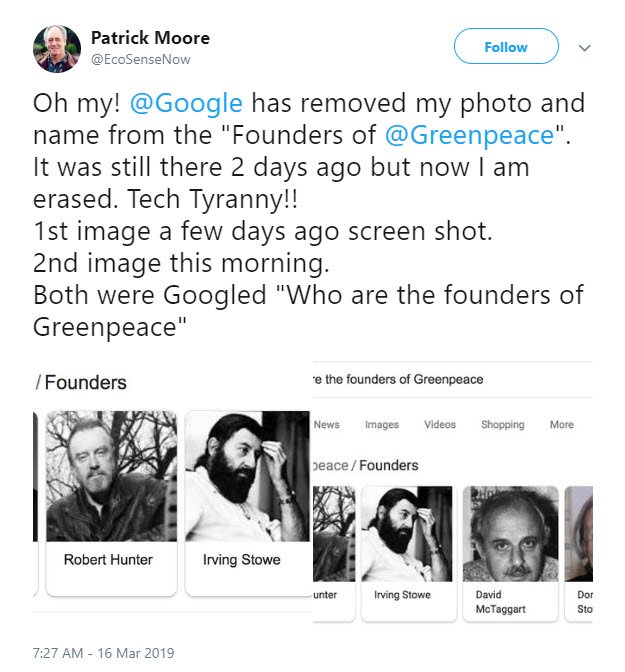
@semanthicc Google isn't *shifting* toward graphs, it long ago made that shift and there's no turning back. With the Knowledge Graph in 2012, Google shifted from generating lists of ranked document summaries that might have the facts a user is looking for to doling out the facts directly.
@semanthicc And while the Knowledge Graph may not represent the whole of Google's query response real estate, the entity-based approach it engenders has impacted all of Google's search. Whatever you query, Google's now try to figure out what you *mean& and respond accordingly.
@semanthicc "Accordingly" means as much as possible providing you with the fact or resource you're asking about directly (which - to "graph-based" - absolutely requires you have a graph-like understanding of the things the user's asking about and, vitally, how they're connected).
@semanthicc So Google is less and less trying to understand a query so it can return a link to some content that might be relevant to the query - though Google's going to continue to provide blue links (now better links because the Graph gives them better ways to understand that content).
@semanthicc And more and more so it can isolate the things you're talking about in your question, and figure out what facts for which you might be looking, and where those facts might reside, and how they might be rendered for you, and what your next question might be.
@semanthicc The shift somewhat impacts "traditional SEO content best practice" insofar as it's an utterly different approach to satisfying queries, with Google using the content it discovers in a completely different way than when it was focused on generating ranked document summaries.
@semanthicc And all the while it's availing itself of the opportunity they opened up with their graph to integrate more and more sources of information, so web pages are just one of the sources of facts they have at their disposal, the traditional web for so much becoming more unnecessary.
@semanthicc To a certain degree the pre-2012 world persists in the blue links part that remains, where one's still able to parlay satisfying a targeted query into profit by creating content that's tailored to it (but even at that with featured snippets search-to-content journeys are fewer).
@semanthicc Vast swathes of carefully-crafted content have been rendered useless by their relative uselessness. By this I mean this content is useless as a source of information when there's literally any other more authoritative source than your marketing material.
@semanthicc Cruel truth: at the end of the day if some factual information present in your content really is important, you should want it served to the person seeking it as directly as possible. It should be great that the Home gave the answer and I didn't need to go to your website.
@semanthicc I bet you would agree when in government Paola, but a large portion of the marketing world, and especially SEO-world, still considers visits to their websites from Google as some sort of entitlement. :)
@semanthicc There, I can only speak for myself in terms of user experience, and I don't want to visit your website. No, really. Ever. I want information made available to me when I need it, and in the digital environment where that need occurs. I don't want your content, I want your help.
@semanthicc Which is why the outrage over Google's supposed content theft is a moot point for me. On mobile especially I want the least possible friction between me and my info, thanks - mobile, indeed, being basically the reason *for* the Knowledge Graph.
@semanthicc (Please don't @ me about Google keeping people "on Google". I think many of the points usually made about Google's monopolistic power have lots of merit, but whether nefariously or not Google has correctly assessed that I should not be sent on unnecessary journeys.)
@semanthicc So as it pertains to content and SEO, it was great you raised #schema.org. In 2005 if you wanted to know the price and ratings of some product in the SERPs you had to visit its landing page. Mark that page in up 2012 and those facts are right there in the results.
@semanthicc Price, rating = facts. Facts > scrolling. Google search 2012 > Google search 2005.
@semanthicc (By the way it matters not at all whether or not the world adopts #schema.org in terms of what direction ye olde Googles of the world will take. Google is going to try to, and continue to have success with, better understanding the Internet's content whether structured or not.)
@semanthicc Anyway, to wrap this up, IMO the best way to think about how Google's graph-ness has impacted content and SEO is to reflect on how content on the Internet has itself evolved, where we can now understand websites to be a decreasingly important artifact of the early Internet.
@semanthicc Certain types of content remain valuable, like opinions (especially product reviews), art, recipes - bits of information that are inherently unique. But that's because it's that information that has valuable, not where it resides.
@semanthicc And I think the impact of a graph-enabled, fact-based approach to search has on "SEO content best practice", brought to its logical conclusion, is absolutely radical: most marketing content isn't required by search, because most of that content isn't required at all.
• • •
Missing some Tweet in this thread? You can try to
force a refresh











